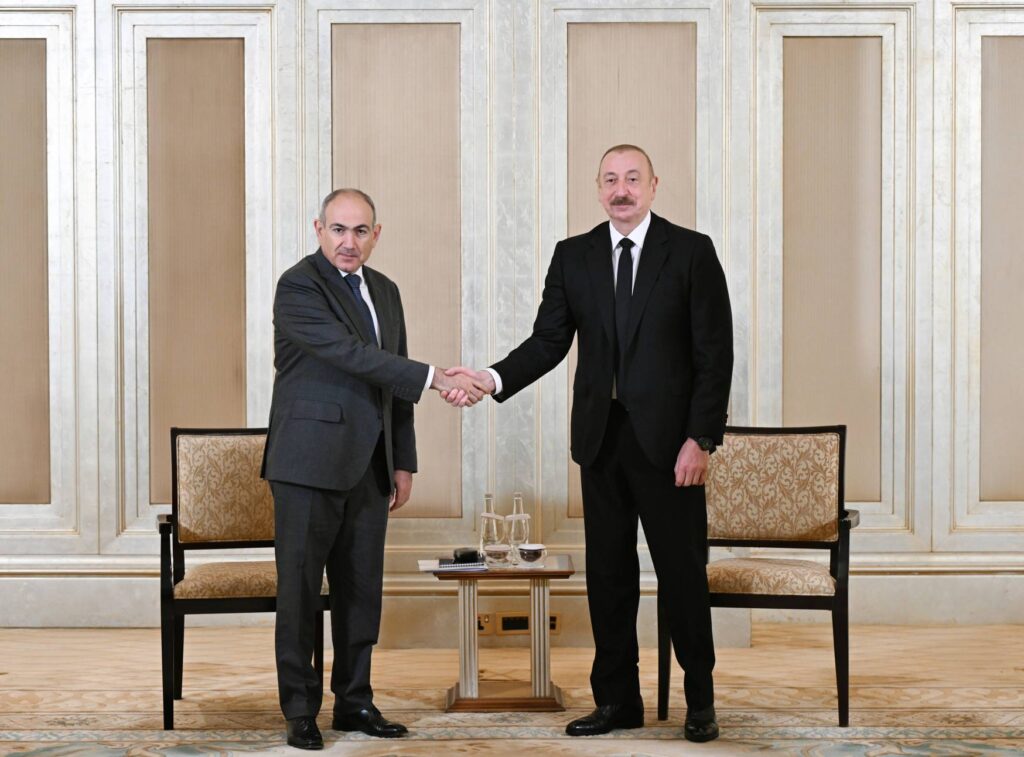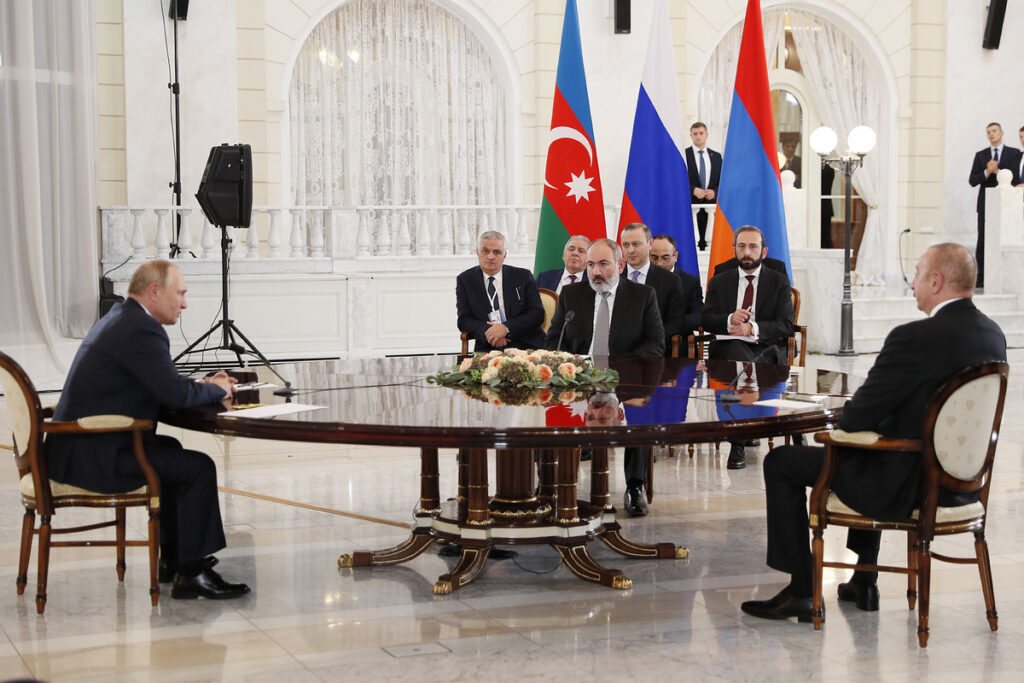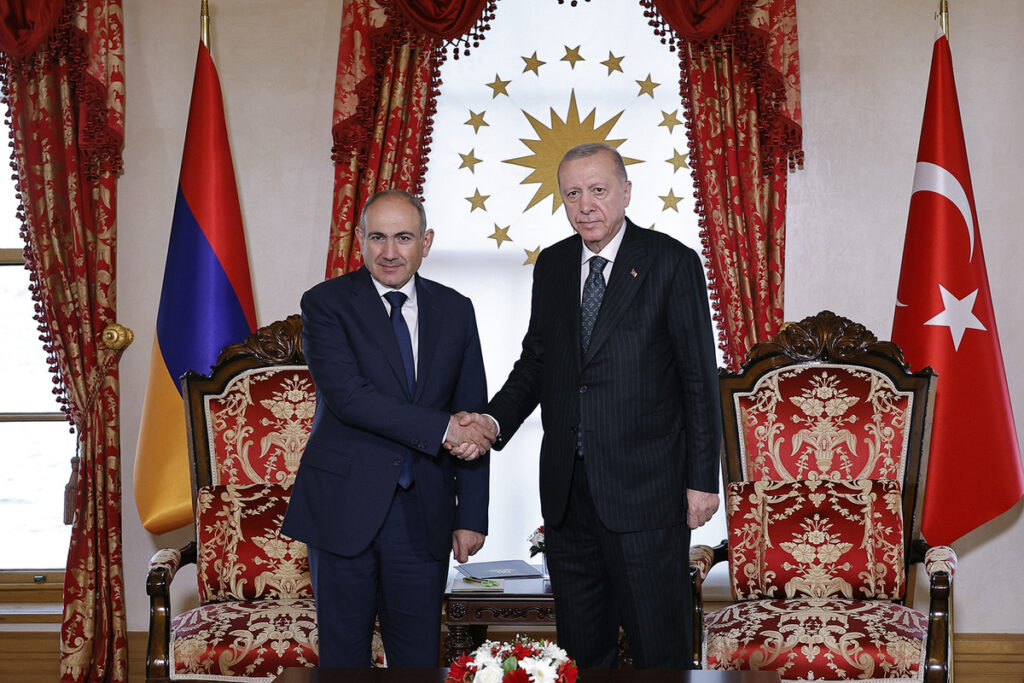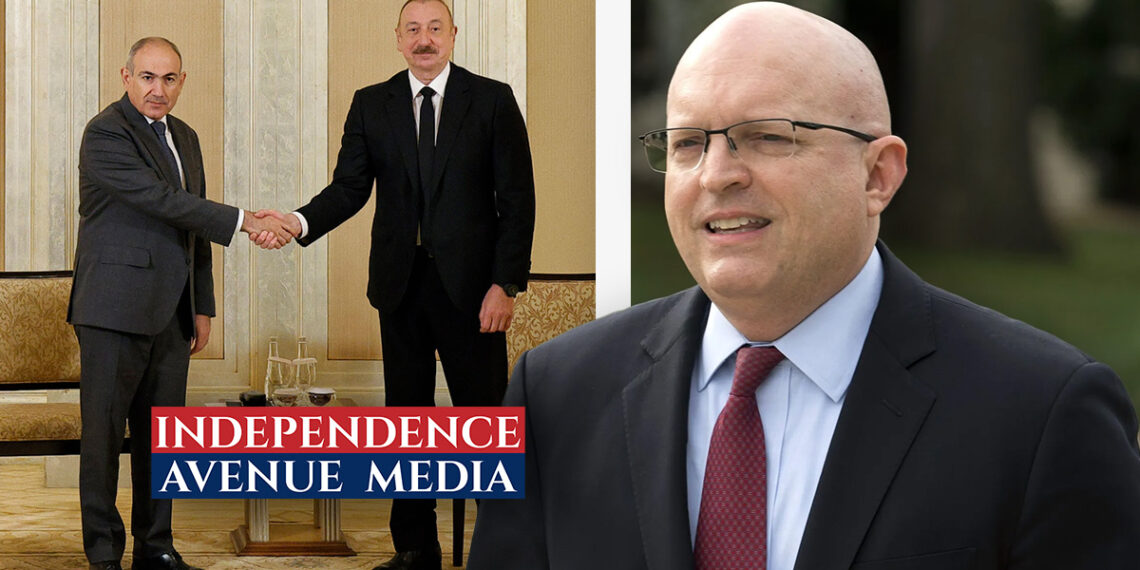Former U.S. Ambassador and Assistant Secretary of State Philip Reeker says Armenia and Azerbaijan have a historic moment of opportunity to secure a peace agreement following decades of war and mistrust. In a conversation with Independence Avenue Media’s Editor in Chief, Ia Meurmishvili, Reeker reflects on the latest developments in the South Caucasus, including a reported U.S. proposal to facilitate security along the so-called Zangezur Corridor—possibly through a 100-year lease arrangement.
Reeker, who previously served as acting assistant Secretary of State for European and Eurasian affairs, U.S. ambassador to North Macedonia, and senior adviser for Caucasus negotiations, is now a partner at the global strategic advisory firm DGA-Albright Stonebridge Group. He underscores how the current leaders of Armenia and Azerbaijan “have developed a level of trust with each other,” calling it “one of these moments in history where there are two personalities in leadership positions who can really get things done.”
While the U.S. has not confirmed details of any leasing proposal, Reeker says Washington’s continued involvement reflects its commitment to stability in the region. In recognizing that “they don’t need Moscow,” Reeker notes, Armenia and Azerbaijan are challenging Russia’s long-standing pattern of regional interference.
The following interview was recorded on July 18, 2025, and has been edited for length and clarity.
Independence Avenue Media Editor in Chief Ia Meurmishvili: Both Armenia and Azerbaijan confirmed that the United States offered some sort of involvement in securing and operating the so-called Zangezur Corridor through a 100 year lease. Tell us more about that. What is the corridor, what’s happening, and what does this news mean?
Former Acting Assistant Secretary of State Philip Reeker: Azerbaijan includes in its overall geography, as an independent and sovereign country, a so-called exclave—the Nakhchivan Exclave [also known as the Nakhchinvan Autonomous Republic], which is separated from the rest of Azerbaijan by a portion of Armenia. At its narrowest, it’s around 30 kilometers across. Azerbaijan has sought connection between those two parts.
That’s always been an important, agreed upon thing to discuss between Armenia and Azerbaijan as they pursue peace – that is how to improve transportation and communication connections. So this corridor, whether it’s rail or road or both, has been, first of all, an important part of the negotiations, but also a sticking point.
Armenia is concerned about giving up any sort of sovereignty over its territory for this corridor—road or rail—to cross it. Azerbaijan has been concerned about security if it doesn’t have control.
Independence Avenue Media Editor in Chief Ia Meurmishvili: Both Armenia and Azerbaijan confirmed that the United States offered some sort of involvement in securing and operating the so-called Zangezur Corridor through a 100 year lease. Tell us more about that. What is the corridor, what’s happening, and what does this news mean?
Former Acting Assistant Secretary of State Philip Reeker: Azerbaijan includes in its overall geography, as an independent and sovereign country, a so-called exclave—the Nakhchivan Exclave [also known as the Nakhchinvan Autonomous Republic], which is separated from the rest of Azerbaijan by a portion of Armenia. At its narrowest, it’s around 30 kilometers across. Azerbaijan has sought connection between those two parts.
That’s always been an important, agreed upon thing to discuss between Armenia and Azerbaijan as they pursue peace. That is how to improve transportation and communication connections. So this corridor, whether it’s rail or road or both, has been, first of all, an important part of the negotiations, but also a sticking point. Armenia is concerned about giving up any sort of sovereignty over its territory for this corridor—road or rail—to cross it. Azerbaijan has been concerned about security if it doesn’t have control.

Certainly, when the United States has been involved, including when I was part of discussions, we kept trying to remind both parties that there were options, ways to achieve this using technology, using third parties, international groups, whether private or other countries or other international organizations, to help facilitate creation of this kind of corridor.
So, I’m pleased to hear that there seems to be some ideas floating out there, and that the presidents or the leaders of the two countries, [President [Ilham] Aliyev of Azerbaijan and Prime Minister [Nikol] Pashinyan of Armenia, are meeting in person. And it’s great to see that the United States continues to offer its good offices, its diplomacy and support to help them reach this peace agreement, something which they have fundamentally agreed to in draft as they announced in March.
Meurmishvili: Do you think it’s a realistic concept for the U.S. to lease this corridor for 100 years?
Reeker: Well, I think there could be all kinds of formulas and ways of doing this, whether it’s the U.S. or a private element that’s involved. [But] the key here is about sovereignty. Armenia doesn’t want to give up sovereignty over its territory. Azerbaijan wants to have that connection between two parts of its country and have that with security. By using international [engagement], whether other countries or private means, I think they can find a solution to do that. What’s been talked about in the press—[and] certainly, I don’t know the details – is that it gives both sides something to work with and pursue through their own conversations and with the support of others in this diplomatic process.
Meurmishvili: How would you describe this project — as strictly commercial or do you think it’s some sort of geopolitical pivot in the Caucasus region?
Reeker: Well, clearly, it’s more than commercial. It’s about countries fulfilling their goals… This is a piece of history and geography — a legacy of not just the Soviet era but times since, and trying to find practical solutions to do that. So, [yes], there’s a commercial aspect. You want to have trade and openness. Armenia has pursued that as well, in terms of their idea of a so-called “crossroads of peace,” to open up more borders with all of their neighbors, including Azerbaijan, to promote trade, to promote engagement among people. [But] you need security to do that. You need a level of confidence. And let’s face it, this is a region that has been wracked by war. [These are] two countries who have extremely bitter histories together, particularly in recent years. Two wars fought in the past 40 years — brutal wars.
Now they have a formula for peace, and they have to work out some of these details. I think we’ve got two leaders that are able to do that and, with the support of the international community and creative thinking on the part of lawyers — and technology for that matter, in terms of how to control and secure borders and customs regimes — I think they can really find a way forward on this. So, I’m quite hopeful.
Meurmishvili: Do you think this is a prerequisite for signing the peace deal between Azerbaijan and Armenia? This has been sort of hanging over the peace deal for a while now.
Reeker: Now, this has been a key issue going back many, many years. And when I was involved in the talks [while] at the State Department and trying to bring the two sides together, this was always an issue that both sides recognized they needed to address. They have, as you see, had different concerns, as we’ve discussed, and different approaches. But the whole point of opening transport and communications, which was a fundamental principle of their engagement toward a peace agreement — and then a commitment that they took almost three years ago when the two sides met here in Washington under the auspices of the Secretary of State – [was] that they would remain engaged to discuss how they could establish a route to connect Azerbaijan proper with Nakhchevan, and reciprocal access for Armenia through Azerbaijan in terms of opening border points so that people could move more freely there.

Meurmishvili: Things are moving very fast both in terms of Aliyev and Pashinyan meeting and interacting, but things are also moving very fast as it comes to Russia. Especially Azerbaijan-Russia relations, and of course Armenia-Russia relations. So, what would be your assessment of Russia’s role?
Reeker: Well, let’s remember Russia is very much distracted, of course, by Putin’s war against Ukraine, which takes tremendous amounts of their resources and is the top priority for him. I think in the South Caucasus, you’ve seen a long history of Russian interference. And even in more recent years, a sort of malign influence [in which] both Azerbaijan and Armenia — not to mention Georgia, of course, which remains almost 20 percent occupied by Russian forces—have come to understand that Putin and his regime do not have the interests of the Caucuses countries at hand.
I think you’ve seen Armenia express their desire to distance themselves from Moscow. They still have, of course, Russian troops on a base there. You’ve [also] seen Azerbaijan assert itself. President Aliyev has been very clear about his views of some of the Russian actions, like shooting down an Azerbaijani passenger jet and, at first, trying to deny their involvement in that.
So, Russia under Putin’s control will continue to try to disrupt efforts. They have a long history of liking frozen conflicts that can disrupt opportunities for peace and progress. They see that as more in their interest. But I think both Armenia and Azerbaijan have found common ground in the fact that they realize they don’t need Moscow. They’ve tried to, I think, be respectful of the engagement that Russians have had over the years, certainly that helped bring an end to their war in 2020.
But, now we see Armenia and Azerbaijan having bilateral approaches with two leaders who I think have found one of these moments in history where there are two personalities in leadership positions who can really get things done. They’ve developed, I believe, a level of trust with each other. This is an area and a situation that is one of great mistrust. There’s very little confidence, and they have to work on building confidence through these person-to-person engagements, and that’s something I always encouraged both leaders to do the more often — that they could meet together and it didn’t have to be in Washington or in Brussels or Geneva or Moscow, it could be even next door in Georgia.
Certainly Abu Dhabi, where they met just last week, is close by and provides a good place for them to sit down and talk about these issues and then have their teams continue on the bilateral track. [These follow-up meetings can] include issues like border demarcation [in] this corridor that we’ve talked about and other confidence-building measures so that they can, hopefully, in 2026, finally sign the agreement that they announced in March [and] really declare peace in the region.
That’s an opportunity for the whole South Caucasus — [for] all three countries to really benefit from peace, security, and the opportunity to play the role that they can as a crucial corridor between East and West for trade, for investment opportunities, infrastructure, north-south corridors, ports on the Black Sea, and of course energy and the pipelines that have been crucial to the region already for many decades.
Meurmishvili: Well, let’s say if it happens this year. Secretary of State Marco Rubio has teased that the agreement may be coming. He, of course, did not specify exactly when. But how closely do you think the U.S. is involved? I understand that you’re not involved on the government side, but what would be your anticipation for how closely the U.S. is involved in this?
Reeker: Well, I think they remain committed and involved, and that’s something that’s occurred through administrations. I worked on issues in the region during the first Trump administration, then during the Biden administration, before I retired from government. And I’m pleased to see that colleagues at the State Department, including [Secretary Rubio], have remained engaged and that other envoys on behalf of the president have been engaged, whether it’s Mr. [Steve] Witkoff, [or] whether it’s Tom Barrack, the president’s ambassador to Turkey [who] was recently named his special envoy for Syria. He [Barrack] has also taken an interest and commented on the importance of getting this done, and how the U.S. stands ready to help and facilitate whatever might be useful for the two countries to feel comfortable and move ahead with their peace.
Meurmishvili: Turkey is of course a very impactful, very powerful player in the region, a close ally to Azerbaijan, and does not have diplomatic relations with Armenia. But recently we’re seeing that there is movement in that direction as well, where Pashinyan has met with [Turkish President Recep Tayyip] Erdogan. There is a conversation going on. Where do you think that can go? Do you think it’s possible to restore diplomatic relations and open borders between Armenia and Turkey?
Reeker: I do think that that’s possible. It’s something that was part of the mix that we talked about just a few years ago, when I was involved in the process. Look, Turkey and Armenia have a long and difficult history with each other, but they’re neighbors. And, as I always say, you cannot change geography. Geography matters and that’s going to be a reality. [But to have] secure borders, which can [then] be used to unite and promote economic activity, commerce, transport, prosperity, you need to establish relationships and modalities for keeping those borders secure.

Now with Azerbaijan’s support and a serious peace process between Baku and Yerevan, Ankara has an opportunity to move forward on this as well. And you saw the visit by Prime Minister Pashinyan to Turkey, where he met with President Erdogan. That’s historic. Again, showing that he is a man of courage, of vision, willing to take political risks in order to move things forward. And I was very pleased to see that. It’s not the first time, obviously, that they have met. They’ve met at international fora, and Pashinyan himself visited Turkey also in 2023 and moved forward on their agreement back in 2021 to launch efforts toward normalizing their ties and, especially, to trying to get some of those border crossings open.
Meurmishvili: You mentioned something very interesting and important, how Pashinyan, more so than any other leader involved, is risking his political future. And that’s an assessment that you hear very often: “Can Pashinyan survive this?” What’s your view on that? How risky of a position is he in right now? And is he navigating this correctly?
Reeker: Well, Pashinyan came into office with strong support, and he was reelected with strong support, even after Armenia lost the brutal war. I think that’s because the people of Armenia liked his message of trying to move the country forward [and] out of this situation it’s been in. As Prime Minister Pashinyan said to me, “We have a country. This is our country, and we need to focus on this. We need to have peace. We need to have security. And we need to start moving forward in terms of modernizing the economy, taking charge of our own future.” And I think he has shown, again, great courage in that.
They have elections in Armenia again in less than a year. In June of 2026, parliamentary elections will [again] be held. That’s why you’ll see an uptick in domestic politics. You’ll see an uptick in issues, in challenges, accusations from opposition and others. You’ll see interference from Russians and others. It’s why I’ve encouraged—and hope we’ll see—movement, first and foremost on the Armenia-Azerbaijan front, because I think declaring peace and saying “we have a lot more to do to have good relations to overcome decades if not centuries of tension. But we are declaring that there is peace between our two countries. And we’re going to focus on things that will really matter for people.” [This would] give them security to then pursue prosperity, commerce and other opportunities, including in the tech sector, where Armenia has shown some great promise [as] they’ve been trying to build their economy. But they need to have access, as a landlocked country, to their neighbors, to the Black Sea and its ports. And all of these things tie in together for a better future for a region that is very difficult.
Let’s remember that the other country in this equation, that we haven’t mentioned yet, is Iran. All eyes continue to watch what happens in Iran as well. It’s a tough neighborhood, but I think they can begin to see a better future for all the people in the neighborhood by pursuing these diplomatic efforts.
Meurmishvili: I thought you were going to say one country that we have not yet mentioned is Georgia, which you mentioned once. How do you see Georgia’s role in this? Where do you see Georgia in this transformational process that we’re seeing in the Caucasus right now? What’s your view of Georgia in this context?
Reeker: Well, going back to my paradigm that you can’t change geography: History can be interpreted, history can be made. But that fact of geography is immutable, and because these countries are neighbors, they’ll have to work through these issues. Georgia has historically been able to maintain good relations with both of its South Caucasus neighbors—that is, with Armenia and with Azerbaijan. In fact, during the early days of the peace process, as the war ended, Georgia and its government played a very valuable role. I worked very closely with then Prime Minister [Irakli] Garibashvili to help negotiate the freeing of Armenians, who were still being held prisoner by Azerbaijan. That role was crucial, and they always maintained that they’re good offices, their facilitation was available to both sides in that.
Georgia, of course, has had challenges of its own. In terms of its democracy, in terms of the protests that have been held, in terms of the direction that their current government is taking. And that is, of course, of concern to some people. Again, these three countries are going to have to work out modalities to work with each other because they’re all interdependent.
Turkey then plays a very big role as the largest country, and obviously there are lots of other geopolitical factors like Ukraine and the outcome of the war there, and the reconstruction of Ukraine. That, of course, is going to make this a vital transit corridor through the Caucasus, from the east, from Central Asia—the resources that are there—into the Black Sea for Ukraine reconstruction and for better energy flows. All of these pieces are going to be a part of it and Georgia is going to want to pay attention to that. It has real opportunities to make its ports on the Black Sea much more lucrative. [There are obviously] crucial factors in moving forward, but they’re going to have to maintain good relations, obviously, with both of their neighbors. And I think that’s what we can hope to see, step by step, that all three countries of the Southern Caucasus will benefit from a blossoming of peace and efforts to unify their economies in the sense that they all rely on each other. [In that way], the geography can become a positive for them instead of a challenge.
Meurmishvili: How significant do you think it is that Turkey is stepping up in the Caucasus?
Reeker: Well, I think you’re right. What we’re seeing is, again, a lot of historic trends that are reemerging again. The Russian-Turkish relationships, throughout history have, shall we say, been represented through difficult wars, difficult relationships, efforts at promoting and expanding empires. The countries in the South Caucasus have often paid the price for that.
I think what we would hope to see — and I think there are opportunities here — is constructive engagement. Turkey, of course, with an enormous economy, as a gateway, in so many ways, to the whole region — through the Bosphorus to the Black Sea; Istanbul as the major center for trade, for commerce, for cultural exchange. All of these are important roles that Turkey can play. That’s why it’s important for them to work out their challenges with Armenia and continue to promote a good relationship with Azerbaijan but recognize that Azerbaijan is a sovereign country. And, of course, many people don’t realize Azerbaijan was not part of the Ottoman Empire or under the Turks, even though they share a sort of Turkic commonality through language and other traditions.
It’s a region, as you know, of great complexity — a tremendous amount of history and a lot of animosity, not a lot of trust. But let’s try to reverse that. I think there could be a very positive history ahead.
I’m encouraged by the type of engagements we have: Pashinyan visiting Turkey; Pashinyan and Aliyev together in Abu Dhabi discussing their issues, moving a peace process forward. I hope Georgia can try to get itself back on track to play a constructive role in the region, as they have in the past, and that we can all really see a changed South Caucasus. And I think the United States would welcome that, as administrations have, for a number of decades now, made a role to support those countries in fulfilling their own potential.


